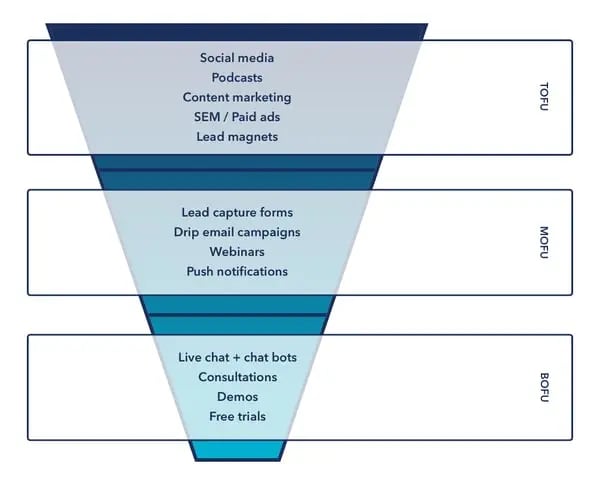A beginner’s guide to lead management software helps businesses manage and nurture their leads efficiently. In this guide, we will explore the benefits of using lead management software, how it works, and key features to look for when choosing the right solution for your business needs.
Whether you are a small business owner or a large enterprise, lead management software plays a crucial role in streamlining your sales processes, optimizing lead conversion, and improving overall efficiency. By implementing effective lead management software, you can effectively track, organize, and prioritize leads, allowing your sales team to focus on the most promising opportunities and close deals faster.
What Is Lead Management Software
Lead management software is a powerful tool designed to help businesses streamline and optimize their lead generation and nurturing processes. It provides a systematic approach to managing leads throughout their lifecycle, from initial contact to conversion and beyond. With the right lead management software, businesses can effectively capture, track, and manage leads, increasing their chances of converting them into loyal customers.
Features Of Lead Management Software
Lead management software offers a range of features that enable businesses to effectively handle their leads. Here are some key features to look for:
- Lead Capture: Easily capture leads from various sources such as websites, landing pages, social media, and more.
- Lead Tracking: Keep a record of every interaction with each lead, including emails, phone calls, and website visits.
- Lead Scoring: Assign scores to leads based on their engagement level and potential to convert, helping prioritize leads for sales follow-up.
- Lead Nurturing: Automate personalized and targeted communication with leads to nurture relationships and move them closer to conversion.
- CRM Integration: Seamlessly integrate with customer relationship management (CRM) systems to synchronize lead data and enhance collaboration between sales and marketing teams.
Importance Of Lead Management Software
Lead management software plays a vital role in the success of any business. Here’s why it’s so important:
- Efficient Lead Management: With lead management software, businesses can efficiently manage leads, ensuring prompt follow-ups and preventing leads from slipping through the cracks.
- Improved Sales Conversions: By effectively nurturing leads and providing sales teams with valuable insights, lead management software empowers businesses to improve their sales conversion rates.
- Enhanced Collaboration: Lead management software promotes better collaboration between sales and marketing teams by enabling them to share valuable data and insights, resulting in more effective lead qualification and follow-up.
- Streamlined Processes: Automating lead management processes eliminates manual tasks, reduces human error, and allows teams to focus on more strategic activities, ultimately saving time and resources.
Choosing the right lead management software can have a significant impact on your business’s bottom line. By implementing an efficient lead management system, you can effectively nurture and convert leads into loyal customers, driving growth and success.

Credit: blog.hubspot.com
Benefits Of Using Lead Management Software
Lead management software can greatly benefit businesses by streamlining their lead generation and conversion process. With the right lead management software in place, businesses can experience increased efficiency, improved lead conversion rates, and enhanced lead tracking capabilities. In this section, we will explore these key benefits in more detail.
Increased Efficiency
Using lead management software can significantly increase the efficiency of your lead management process. By automating tasks such as lead scoring, lead distribution, and follow-up communications, the software allows your sales team to focus on high-value leads and close deals faster. With a centralized platform to manage all leads, contacts, and communication history, you can avoid the hassle of manual data entry and easily prioritize your prospects.
Improved Lead Conversion
The main goal of lead management software is to help businesses convert leads into customers. By utilizing features like lead nurturing campaigns, personalized messaging, and real-time lead tracking, you can effectively engage with your leads at every stage of the buying process. The software enables you to deliver the right content to the right leads at the right time, increasing the chances of converting them into paying customers. Moreover, with access to comprehensive lead analytics and reporting, you can continuously optimize your strategies to improve conversion rates.
Enhanced Lead Tracking
Lead management software offers robust lead tracking capabilities that enable you to track the progress of each lead throughout the entire sales cycle. With the ability to monitor lead interactions, website activities, and communication history, you can gain valuable insights into your leads’ interests, preferences, and engagement level. This information allows you to tailor your approach and communication for each lead, ultimately improving the quality and effectiveness of your sales efforts. Additionally, with real-time notifications and alerts, you can promptly act on hot leads and prioritize follow-ups.
Choosing The Right Lead Management Software
Finding the right lead management software can be overwhelming for beginners. This guide offers valuable insights to help you make informed decisions and optimize your lead management process effectively.
Introductory Paragraph
Choosing the right lead management software is crucial for businesses looking to optimize their lead generation and conversion processes. With the abundance of options available in the market, it can be overwhelming to select the perfect software solution that meets your specific needs. In this post, we will discuss three key factors to consider when choosing lead management software, including identifying your needs, considering user-friendliness, and integration with existing systems.
Identify Your Needs
Before diving into the selection process, it is important to identify your needs and requirements. This will help you narrow down the available options and focus on software solutions that align with your goals. Start by assessing your business’s size, industry, and target audience. Determine the volume of leads you generate and the complexity of your sales process.
Additionally, consider the specific features and functionalities you require from the lead management software. These may include lead capture forms, lead nurturing tools, lead scoring, segmentation capabilities, and integration with other marketing and sales tools.
Consider User-friendliness
Usability plays a crucial role in the successful implementation and adoption of lead management software. When evaluating different options, consider how easy it is to navigate and use the software interface. Look for intuitive designs that minimize the learning curve for you and your team.
Furthermore, check if the software provides comprehensive onboarding support, documentation, and training materials. Having these resources readily available can accelerate the onboarding process and ensure a smooth transition for your team.
Integration With Existing Systems
Integration is another critical factor to consider when choosing lead management software. Evaluate whether the software can seamlessly integrate with your existing customer relationship management (CRM) system, marketing automation tools, email marketing platforms, and other software your team relies on.
Smooth integration enhances your team’s productivity by enabling data flow and eliminating manual tasks. Assess the compatibility and available integration options of each software solution to ensure a seamless flow of information and maximize the effectiveness of your lead management efforts.

Credit: www.wrk.com
Implementing Lead Management Software
Implementing lead management software is an essential step towards streamlining your sales process and enhancing the efficiency of your lead generation efforts. To ensure a successful implementation, there are a few crucial aspects to consider. In this article, we will guide you through the process of implementing lead management software, covering important steps such as getting buy-in from stakeholders, training your team, and customizing the software.
Get Buy-in From Stakeholders
Before introducing lead management software to your organization, gaining buy-in from stakeholders is crucial. This ensures that everyone understands the benefits of the software and is prepared for the changes it may bring. Here’s how you can get buy-in from your stakeholders:
- Conduct a thorough analysis of the current lead management process to identify pain points and areas for improvement.
- Present the benefits of lead management software, such as increased lead conversion rates, improved data accuracy, and enhanced sales team productivity.
- Create a compelling business case that highlights the return on investment (ROI) potential of implementing the software.
- Address any concerns or objections that stakeholders may have and provide solutions or reassurance.
Train Your Team
An effective training program is essential to ensure that your team fully understands how to utilize the lead management software. Here are some key points to consider when training your team:
- Provide comprehensive training materials, including user manuals, videos, and interactive workshops.
- Focus on the key features and functionalities of the software that align with your specific business needs.
- Encourage hands-on practice to enable your team to familiarize themselves with the software’s interface and functionality.
- Offer ongoing support and troubleshooting assistance to address any questions or challenges that arise during the training process.
Customize The Software
To maximize the effectiveness of your lead management software, it is important to customize it according to your organization’s unique requirements. Consider the following customization options:
| Customization Option | Benefits |
|---|---|
| Define lead stages and statuses | Allows you to track leads at various stages of the sales process and tailor your communication accordingly. |
| Create custom fields | Enables you to capture specific information relevant to your industry or business model. |
| Set up automated workflows | Automates repetitive tasks and ensures consistent follow-up with leads, saving time and increasing efficiency. |
| Integrate with other tools | Allows seamless data exchange between lead management software and other systems, enhancing overall operational efficiency. |
By customizing the lead management software to meet your organization’s needs, you can create a more streamlined and effective lead management process.
Implementing lead management software requires careful planning and execution. By getting buy-in from stakeholders, training your team adequately, and customizing the software, you can optimize your lead management process and drive more successful conversions.
Best Practices For Lead Management Software
When it comes to managing your leads effectively, implementing the best practices for lead management software is crucial. By following these practices, you can ensure that your lead management software operates at its optimal potential, helping you convert more leads into customers. In this section, we will discuss three key best practices for lead management software: regular data maintenance, effective lead nurturing, and continuous performance evaluation.
Regular Data Maintenance
To get the most out of your lead management software, it is essential to regularly maintain your data. Regular data maintenance ensures that your lead database is up to date and accurate, allowing you to effectively target and engage with your leads. Here are some best practices for regular data maintenance:
- Run regular data cleansing procedures to identify and remove duplicate or outdated information from your lead database.
- Verify the accuracy of your lead data by conducting periodic data validation checks.
- Update your lead records with any new information obtained through interactions or lead capture activities.
- Segment your leads based on relevant criteria, such as demographics or interests, to personalize your marketing efforts.
Effective Lead Nurturing
Lead nurturing is a critical step in the lead management process. It involves building relationships with your leads, guiding them through the sales funnel, and ultimately converting them into customers. Here are some best practices for effective lead nurturing using lead management software:
- Develop a well-defined lead nurturing strategy that aligns with your overall marketing goals and target audience.
- Create personalized and targeted content that caters to the specific needs and interests of your leads.
- Automate your lead nurturing process by setting up drip campaigns and autoresponders to deliver timely and relevant messages.
- Track and analyze the engagement and behavior of your leads to identify their interests and tailor your nurturing efforts accordingly.
- Continually refine and optimize your lead nurturing strategy based on the insights and feedback obtained from your lead management software.
Continuous Performance Evaluation
Regularly evaluating the performance of your lead management software is essential to identify areas of improvement and make data-driven decisions. By continuously evaluating the effectiveness of your lead management efforts, you can enhance your lead conversion rates and grow your business. Here are some best practices for continuous performance evaluation:
| Evaluation Criteria | Best Practices |
|---|---|
| Lead Conversion Rate | Monitor and analyze your lead conversion rate to identify any bottlenecks or opportunities for improvement. |
| Lead Response Time | Measure the time it takes for your team to respond to leads and strive for prompt and timely responses. |
| Lead Source Performance | Track and evaluate the performance of different lead sources to identify which channels yield the highest quality leads. |
| Lead Follow-up | Ensure that all leads are promptly followed up on, and monitor the effectiveness of your follow-up process. |
By following these best practices for lead management software, you can improve the efficiency and effectiveness of your lead management efforts, leading to higher conversion rates and business growth.

Credit: www.linkedin.com
Frequently Asked Questions Of Beginner’s Guide To Lead Management Software
What Is The Best Software For Lead Management?
The best software for lead management would depend on the specific needs and preferences of a business. However, some popular options include HubSpot, Salesforce, and Zoho CRM. These software solutions offer features such as lead tracking, contact management, and sales automation to effectively manage and nurture leads.
How Do You Set Up A Lead Management System?
To set up a lead management system: 1. Define your lead capturing process and criteria. 2. Choose a lead management software or CRM platform. 3. Customize the system to align with your business needs. 4. Integrate the system with your website and marketing channels.
5. Train your team on how to effectively use the system for lead nurturing and tracking.
What Is The Basic Of Lead Management?
Lead management is the process of capturing, tracking, and nurturing potential customers, known as leads, in order to convert them into loyal customers. It involves strategies to attract leads, qualify them based on their interest and suitability, and carefully manage their journey through the sales funnel towards a sale.
What Are The Five Major Stages Of Lead Management?
The five major stages of lead management are: lead generation, lead capture, lead qualification, lead nurturing, and lead conversion. These stages involve attracting potential customers, collecting their information, evaluating their potential as customers, building a relationship with them, and finally, converting them into paying customers.
Conclusion
Implementing a lead management software is crucial for streamlining and enhancing your marketing efforts. By automating lead capture, tracking, and nurturing processes, you can optimize your lead generation and conversion rate. With the right lead management software in place, your business can effectively manage leads, personalize communication, and ultimately drive revenue growth.
Stay ahead of the competition by embracing this technology and unlocking the full potential of your leads. Start your journey towards success today!




